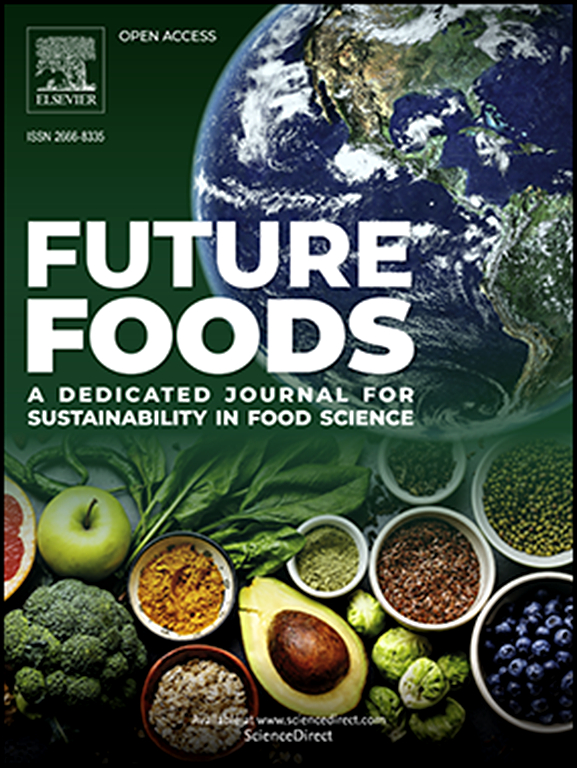Plant-based burgers: effects of protein source, type of extrusion and cooking technology on oxidation status and in vitro digestibility
IF 8.2
Q1 FOOD SCIENCE & TECHNOLOGY
引用次数: 0
Abstract
The effects of cooking method (microwaving/pan frying) and in vitro digestion of plant-based burgers formulated with different protein types (soy/pea) and extrusion types (low/high moisture) were assessed. A conventional beef burger was used as control. Every formulation was adjusted to 18.1–19.5 % of protein. Plant-based burgers showed lower cooking losses (4–13 %) than beef burgers (26–30 %), with microwaving resulting in the highest losses across all samples. Plant-based burgers formulated with high moisture extrusion showed the lowest protein digestibility (66.8–73.2 %). No effect of the cooking method was observed in lipid and protein digestibility in any sample. Soluble peptides increased during in vitro digestion in all samples, with beef burgers showing the lowest levels. The amount of malondialdehyde increased whereas carbonyls decreased in the bioaccessible fraction in all samples during in vitro digestion. Burgers formulated with low moisture extrusion showed the highest lipid oxidation, both after cooking and after in vitro digestion. DPPH values decreased (17–59 %) and ABTS increased (277–810 %) during in vitro digestion. These results suggest that the protein digestibility and lipid oxidation of plant-based burgers (before and after digestion), are more strongly influenced by the type of extrusion than by the type of protein or cooking method applied.

植物性汉堡:蛋白质来源、挤压类型和烹饪技术对其氧化状态和体外消化率的影响
评估了不同蛋白质类型(大豆/豌豆)和挤压类型(低水分/高水分)配制的植物性汉堡的烹饪方法(微波/平底锅煎炸)和体外消化的影响。一个传统的牛肉汉堡作为对照。每种配方的蛋白质含量调整为18.1 - 19.5%。植物性汉堡的烹饪损失(4 - 13%)低于牛肉汉堡(26 - 30%),微波导致的损失在所有样品中最高。高水分挤压配方的植物性汉堡蛋白质消化率最低(66.8 - 73.2%)。未观察到蒸煮方法对任何样品的脂质和蛋白质消化率的影响。可溶性肽在所有样品的体外消化过程中都增加了,牛肉汉堡显示出最低的水平。在体外消化过程中,所有样品的生物可及部分中丙二醛的含量增加,而羰基含量减少。低水分挤压配方的汉堡在烹调和体外消化后均显示出最高的脂质氧化。体外消化过程中DPPH值降低(17 - 59%),ABTS升高(277 - 810%)。这些结果表明,植物基汉堡的蛋白质消化率和脂质氧化(消化前后)受挤压类型的影响比对所采用的蛋白质类型或烹饪方法的影响更大。
本文章由计算机程序翻译,如有差异,请以英文原文为准。
求助全文
约1分钟内获得全文
求助全文
来源期刊

Future Foods
Agricultural and Biological Sciences-Food Science
CiteScore
8.60
自引率
0.00%
发文量
97
审稿时长
15 weeks
期刊介绍:
Future Foods is a specialized journal that is dedicated to tackling the challenges posed by climate change and the need for sustainability in the realm of food production. The journal recognizes the imperative to transform current food manufacturing and consumption practices to meet the dietary needs of a burgeoning global population while simultaneously curbing environmental degradation.
The mission of Future Foods is to disseminate research that aligns with the goal of fostering the development of innovative technologies and alternative food sources to establish more sustainable food systems. The journal is committed to publishing high-quality, peer-reviewed articles that contribute to the advancement of sustainable food practices.
Abstracting and indexing:
Scopus
Directory of Open Access Journals (DOAJ)
Emerging Sources Citation Index (ESCI)
SCImago Journal Rank (SJR)
SNIP
 求助内容:
求助内容: 应助结果提醒方式:
应助结果提醒方式:


